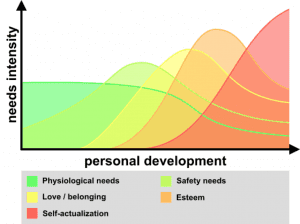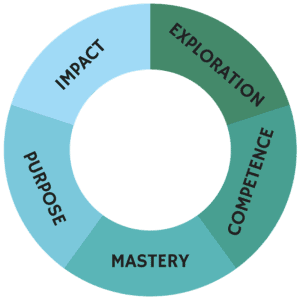By Ryan McCarthy of the Global Kindness Initiative
You’re a fast runner. You’ve trained for years, worked with great coaches, studied the best techniques and workouts, and you’ve got all the best equipment. You’ve mastered your skill.
The field you’re currently running through, however, is extremely foggy. You can barely see more than a few steps ahead of you, and because of that it’s hard to tell where you’re going. You can avoid rocks and potholes with impressive agility, but your overall progress is unclear. You’re tracking all sorts of metrics – your speed, your technique, the number of steps taken – but you still don’t seem to be making any real progress.
Here’s the problem: it doesn’t matter how fast you’re going if you’re running in circles. You need not just a path, but a destination. Not just a How, but a Why.
The World of How
We live in a world of How. How to make more, do more, be more. How to “win.”
But in a world of How, we rarely stop to ask “Why?”
Why are we doing all this? Why should we care about the results? What are we winning and why is it important to win it? The Why gives us our direction, our context, our purpose.
We are, both as individuals and as a society, more empowered to create impact than at any previous point in human history. But just like our metaphorical runner moving extremely fast through blind circles, there is a world of difference between Uninformed Impact – powerful but directionless moves without consideration of the surrounding systems and environments – and what we at the Global Kindness Initiative (GKI) call Informed Impact – moving in line with our own values, capabilities, and surroundings.
In order to have truly sustainable impact, we need something else. We need to understand not just the mechanics of how to create change, but how our work connects to the larger world, the direction it’s going, and the interrelation between the two.
We need both the How and the Why.
The Evolution of Maslow’s Hierarchy
Maslow’s Hierarchy of Needs is one of the most universal and influential models of human development ever developed. But the traditional presentation of a hierarchical pyramid has over time given way to a more nuanced model, like the one below.

Just because we are pursuing higher goals, that doesn’t mean our core needs can be ignored. On the other hand, focusing on our basic needs doesn’t exclude seeking a higher purpose.
Maslow based his theory on a simple premise: it’s difficult to advance to the next stage of personal awareness and development until the needs of the current one are met.
As more of our basic needs are met, we have more capacity to devote mental energy towards our higher needs: identifying purpose, meaning, and impact.
This internal process is mirrored externally as we seek to create effective, powerful, and wide-reaching impact on the world around us.
What is Impact?
Impact is the effect you have on the space around you – be that physical, intellectual, or emotional. You can have impact within a broader system like a career or a relationship, or you can have impact with the application of a tool or technique in a very specific environment.
The amount of impact you have is limited by your ability to be aware of, navigate, and influence that space. At GKI we use a five-stage model which describes the process of maximizing impact within a system, which we call the Impact Cycle:
- Exploration
- Competence
- Mastery
- Identifying Purpose
- Informed Impact

The Impact Cycle follows the progression needed to create lasting and effective change within a given environment, be it internally or externally:
Exploration
When we first enter a new space, we know very little about the landscape. We need to try new things, with the understanding that they may not always go as planned. The Exploration Stage should be inquisitive and open; a beginner’s mind. Your first steps are a long way from your first marathon, but every bit as necessary.
Competence
As we begin to familiarize ourselves with the rough outline of the new environment, we start to learn how it works. But we are still finding our way, and we might still make a lot of mistakes. There may be larger interactions, shortcuts, and networks that we don’t yet see. Our ability to create impact is just starting to develop, although it may often manifest as Uninformed Impact.
Mastery
After enough iterations of Competence, we achieve Mastery. We have performed the needed tasks enough times that they have become routine. We no longer think simply about how to do the tasks and subroutines of the job, but how to do them well, with skill and efficiency.
So now what? So far, we have only mastered the How.
Much like Maslow’s Hierarchy, there is a a natural shift towards higher-order questions about the broader context we are acting within.
Now that we have developed this powerful engine, we must decide where to send it. Regardless of how great our mastery of a skill, without informed direction we cannot have real impact.
The missing piece is identifying our Purpose.
How is what you’re currently doing connected to your larger values? What larger trends are you contributing toward, and how do they interrelate with the thousands of micro actions you take in your daily life? How is what you’re doing now ultimately connected to who you are and who you want to be?
It is only with these two things, Mastery of a skill and Purpose in applying it, that you can have true Impact.
Our work at the Global Kindness Initiative focuses on helping organizations and individuals successfully navigate these transitions and maximize their ability to positively and sustainably impact the systems and environments around them.
We offer a variety of workshops as well as consulting and coaching packages around Diversity & Inclusion, Restorative Conflict Resolution, Mediation, Impact Coaching, and Strategic Communication for both individuals and teams. We deeply believe in the transformative power of aligning one’s skills and resources with their values and direction, and in the absolutely critical need for it at this time in our nation’s history.
With powerful organizational tools like P.A.R.A. and Just-In-Time Project Management to supercharge your implementation, along with powerful framing tools like Impact Coaching and Strategic Communication, we can create a vision for a new generation of skilled, connected, motivated, and empowered leaders ready to change the world in profound and beautiful ways.
Register for a live discussion with Ryan and Tiago on Wednesday, June 13 at 9am Pacific. I’ll interview Ryan about his work at GKI, and we’ll discuss the connections between productivity, knowledge management, social transformation, and a healthy, functioning democracy.
- POSTED IN: Goals, Guest Posts, Personal growth
